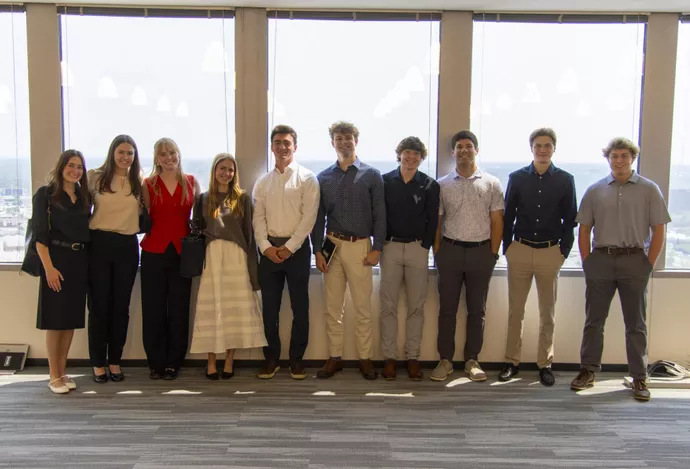August 2025
Pressure Mounts On Young CRE Talent

From “With Entry-Level CRE Jobs Down 19%, Pressure Mounts On Young Talent Who Break In” – BISNOW
Internships in commercial real estate used to be a gateway — a low-stakes way to dip a toe in the industry.
Today, they’re high-pressure, high-stakes opportunities for a shrinking pool of young professionals trying to break in.
Fiona Cunningham, a college student interning at NAI Hiffman this summer, isn’t fetching coffee or entering data. She’s building marketing collateral, contributing to broker tools and running a social media takeover campaign.
“AI is not going away,” Cunningham said. “Embracing it and learning how to use it effectively and ethically for work and school as well is super important. I’m always trying to learn more about AI every day and really understand how to use it correctly.”

Hiffman Intern Fiona Cunningham
Citlali Rizo, a construction intern at McHugh Construction, is managing submittals and requests for information for a penthouse build-out at the United Center.
“I’ve never felt bored a single day on the job,” said Rizo, who studies at the Illinois Institute of Technology. “Every day it’s a new thing.”
But landing that kind of hands-on experience is getting harder.
Internships and entry-level roles in CRE are drying up, and the bar to qualify keeps rising. Firms expect candidates to arrive ready to work, with artificial intelligence fluency, data skills and workflow savvy that used to be taught on the job.
Postings for entry-level CRE roles — those requiring zero to two years of experience — dropped 17% in 2023 and another 9% in 2024, according to CRE job platform SelectLeaders. While the first half of 2025 has seen a modest 7% rebound, total listings remain 19% below their 2021 peak.
More young professionals are feeling the squeeze.
The unemployment rate for recent grads ages 22 to 27 hit 5.8% at the end of March, its highest since mid-2021, according to the Federal Reserve Bank of New York. And 54% of young adults say they’re unsure or worried AI will replace the roles they’re hoping to land, according to a survey from the Broken Marketplace.
“I feel like there really is no certainty when it comes to the job market,” Rizo said. “You can have all this experience, and the company still might not want you.”
In a slower hiring environment, companies are increasingly hesitant to take risks on unproven talent. As a result, more firms are relying on personal connections rather than open postings, said Andy Hunt, executive director of the Vieth Institute for Real Estate Leadership at Marquette University.
Hunt, who works to place students and alumni within six months of graduation, said relationship-based hiring is now more common than it has been in 15 years.
That marks a sharp departure from historical trends — and with overall hiring down, it has made the competition to enter the industry more intense. The relationship-based model isn’t always positive, Hunt added, because it leads to a hiring process that isn’t as “full and equitable” for students.
In past years, most of Hunt’s top-tier students had secured placements by the end of the fall semester. That hasn’t been the case for the class of 2025. Even when students did land roles, they weren’t always in preferred markets or segments of the industry.
“We’ve had a harder time placing candidates that we would stake our reputations on all day,” Hunt said. “Even they are still having a harder time finding these roles in ways that they didn’t in past years.”
Part of the problem is that there are simply fewer tasks left for entry-level professionals to do, Hunt said.
Back-office roles like revenue management, guest services and operations are becoming more efficient, and as a result, new hires are “getting turned down a few notches,” SVN International CEO Lukas Krause said.
Clerk positions, data entry roles and first-touch customer service jobs may also disappear as AI takes over more routine tasks, said Gladys Pagan, assistant vice president of human resources at Draper and Kramer. Companies are shifting their focus toward more complex responsibilities and interpersonal interactions.
But that so-called grunt work — compiling data, building slide decks — once served as a training ground. Without it, firms risk skipping key stages in early-career development, Krause said.
“There’s been a lot more effort … to help educate and coach so that there isn’t some of the lost value in doing the roll-up-your-sleeve work that you do by punching numbers, running spreadsheets, pulling the data, seeing what sources are good, what sources are not,” Krause said. “It’s almost having to bridge that gap, because it’s a little more efficient.”
Pagan said she is concerned that skipping foundational experience could result in critical skill gaps down the line.
“What does the future look like?” Pagan said. “Because we’re skipping that Level 1, and we’re moving to 2, 3 and so on. So I think we may find it a bit more challenging when it comes to certain interpersonal skills training.”
To address that, her company has leaned more heavily on peer mentoring and hands-on support to help new hires develop the skills they used to gain on the job.
Artificial intelligence is also poised to reshape the commercial real estate workforce — though just how much is still unclear.
“AI is going to fundamentally change the hiring within commercial real estate, but we don’t know if that’s actually happening yet,” Hunt said.
He said today’s slowdown in entry-level hiring may have more to do with a sluggish transaction market than with technological disruption. A clearer picture of AI’s impact won’t emerge until CRE enters a full recovery cycle.
“I still believe those jobs will just change to something else,” Hunt said.
In the meantime, students who want to stand out should focus on building AI fluency, Krause said. That includes writing more strategic prompts and learning to critically evaluate large language model outputs — skills that will become increasingly valuable as the tools evolve.
Cunningham, the NAI Hiffman intern and University of Nebraska student, said AI is already playing a growing role in her day-to-day work. While she sees its limitations, she uses it for deeper research tasks and to improve the marketing materials her team produces.
“AI is not going away,” Cunningham said. “Embracing it and learning how to use it effectively and ethically for work and school as well is super important. I’m always trying to learn more about AI every day and really understand how to use it correctly.”
About NAI Hiffman:
NAI Hiffman is one of the largest independent commercial real estate services firms in the US, with a primary focus on metropolitan Chicago, and part of the NAI Global network. We provide institutional and private leasing, property management, tenant representation, capital markets, project services, research, and marketing services for owners and occupiers of commercial real estate. To meet our clients’ growing needs outside of our exclusive NAI Hiffman territory, we launched Hiffman National, our dedicated property solutions division, which provides property management, project services, and property accounting services across the country. NAI Hiffman | Hiffman National is an award winning company headquartered in suburban Chicago, with more than 275 employees strategically located throughout North America.
About Hiffman National:
Hiffman National is one of the US’s largest independent commercial real estate property management firms, providing institutional and private clients exceptional customized solutions for property management, project management, property accounting, lease administration, marketing, and research. The firm’s comprehensive property management platform and attentive approach to service contribute to successful life-long relationships and client satisfaction. As a nationally bestowed Top Workplace, and recognized CRE award winner, Hiffman National is headquartered in suburban Chicago, with more than 275 employees nationally and an additional six hub locations and 25 satellite offices across North America.

